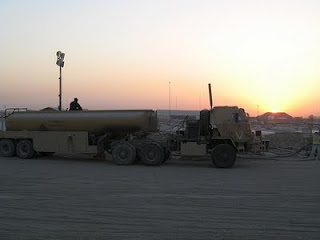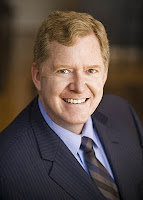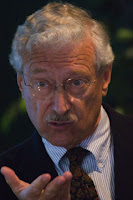Showing posts from category disaster relief.
-
VIDEO – Juan Dumas on Natural Resources, Conflict, and Peace
›February 24, 2010 // By Michelle NeukirchenMediation and conflict resolution around natural resources require “long-term engagement, timely interventions, and lots of flexibility,” says Juan Dumas, senior advisor for the Fundación Futuro Latinoamericano in Quito, Ecuador. The Woodrow Wilson Center and the Fetzer Institute hosted Dumas for a roundtable event on Pathways to Peace: Stories of Environment, Health, and Conflict. In this interview with ESCP Director Geoff Dabelko, Dumas shares key lessons learned from his experience with his NGO that specializes in prevention and management of socio-economic conflicts around natural resources.
In order to overcome challenges posed by current funding procedures, the foundation has been trying to establish an “early-action fund” that would provide flexible funding to facilitate conflict resolution dialogue. “With the right capacities at the right time… you can make a difference… you can prevent the escalation of conflict into violence… and create a governance path for that conflict to be addressed in a different way,” Dumas says. -
NATO Says Don’t Fight the Planet
›Climate and security are under discussion today in Copenhagen at the Danish government’s side event, which brings together heavyweights such as NATO Secretary-General Anders Fogh Rasmussen, Swedish Foreign Minister Carl Bildt, African Union Chair Jean Ping, and Danish Foreign Minister Peter Stig Møller.
Fogh Rasmussen, the former prime minister of Denmark, delivered his remarks the new-fashioned way: today’s Huffington Post. He says NATO is ready to “do its part” by lowering its own carbon bootprint and responding to the increasing humanitarian challenges of a warmer world. He suggests the threat of climate change does not allow powerful institutions like NATO the luxury of sitting on the sidelines.
The post even includes this embedded “Climate Change and NATO” video with an unfortunate screen grab that reads “Fighting the Planet.” Not exactly a reassuring message for those who argue that framing climate change as a security issue will militarize the environment rather than green security (to paraphrase an excellent 1994 edited volume by Finn Jyrki Kakonen).
The video’s actual message is that some security threats can be fought and others shouldn’t be. Climate change will present a security threat, but “Fight the planet and we all lose,” says NATO. Even when the video makes all the right points, those pesky screen grabs can undermine your case! -
Senate, Pentagon Focus on Climate-Security Challenges
›July 31, 2009 // By Brian Klein “Climate change may well be a predominant national security challenge of the 21st century, posing a range of threats to U.S. and international security,” said Sharon Burke, vice president for Natural Security at the Center for a New American Security (CNAS). Her remarks at a July 21 Senate Foreign Relations Committee hearing on climate change and security—along with those of two retired vice admirals and former Senator John Warner—amplified the growing chorus of national security experts and military personnel urging Congress to act promptly to address the security implications of climate change.
“Climate change may well be a predominant national security challenge of the 21st century, posing a range of threats to U.S. and international security,” said Sharon Burke, vice president for Natural Security at the Center for a New American Security (CNAS). Her remarks at a July 21 Senate Foreign Relations Committee hearing on climate change and security—along with those of two retired vice admirals and former Senator John Warner—amplified the growing chorus of national security experts and military personnel urging Congress to act promptly to address the security implications of climate change.
Vice Admiral Lee Gunn, USN (Ret.), called climate change “a clear and present danger to the United States of America,” while Burke cited a 2007 report from the Center for Naval Analysis that defined climate change as a “threat multiplier.”
Security Link Could Push Senate Climate Bill
Senator John Kerry, chair of the Senate Foreign Relations Committee, scheduled last week’s hearing on climate’s security links in a bid to bolster support for congressional action on climate change, which is currently stalled in the Senate. “Just as 9/11 taught us the painful lesson that oceans could not protect us from terror, today we are deluding ourselves if we believe that climate change will stop at our borders,” he said.
Former Senator John Warner echoed this sentiment, noting that the hearing was an opportunity to “educate the American public on these potential risks to our national security posed by global climate change.”
“Leading military, intelligence, and security experts have publically spoken out that if left unchecked, global warming could increase instability and lead to conflict in already fragile regions of the world. If we ignore these facts, we do so at the peril of our national security and increase the risk to those in uniform who serve our nation,” stated Warner, who recently launched the Pew Project on National Security, Energy, and Climate with the Pew Environment Group.
Pentagon Looks to Reduce Reliance on Oil and Drive Innovation
Burke explained that the phenomenon will not only pose “direct threats to the lives and property of Americans” from wildfires, droughts, flooding, severe storms, the spread of diseases, and mass migrations, but will also have “direct effects on the military,” including problems with infrastructure and the supply chain.
As a massive consumer of energy—110 million barrels of oil and 3.8 billion kilowatts of electricity in 2006 alone—the Pentagon has recognized its vulnerability to disruptions in fossil fuel supplies, as well as its potential to develop alternative technologies. As ClimateWire’s Jessica Leber writes in the New York Times: “The long logistics ‘tail’ that follows troops into the war zone—moving fuel, water and supplies in and waste out—risks lives and diverts major resources from fighting.”
According to Leber, two-thirds of the tonnage in Iraq convoys was fuel and water. To mitigate such vulnerability in the future—not to mention in arid, mountainous Afghanistan—DoD has begun testing ways to turn waste into energy, distribute power through “microgrids,” develop jet fuel from algae, desalinate water using little energy, and purify wastewater on a small scale.
“While the military by itself won’t make a market for plug-in vehicles or algae-based jet fuel,” notes Leber in an earlier ClimateWire article, “its investment power can bump emerging climate-friendly technologies onto a larger commercial stage.”
At the hearing, Burke warned against the possible knock-on effects of switching dependence from fossil fuel to other resources like lithium for lithium-ion batteries in electric cars.
The Military Must Manage Uncertainty
Vice Admiral Dennis McGinn, USN (Ret.), a member of the CNA’s Military Advisory Board, dismissed the argument that climate data and projections are too uncertain to form a solid basis for action. “As military professionals,” he told the Senate committee, “we were trained to make decisions in situations defined by ambiguous information and little concrete knowledge of the enemy intent. We based our decisions on trends, experience, and judgment, because waiting for 100% certainty during a crisis can be disastrous, especially one with the huge national security consequences of climate change.”
“The future has a way of humbling those who try to predict it too precisely,” Kerry said at the hearing. “But we do know, from scientists and security experts, that the threat is very real. If we fail to connect the dots—if we fail to take action—the simple, indisputable reality is that we will find ourselves living not only in a ravaged environment, but also in a more dangerous world.”
Photo: A convoy of the U.S. Army’s 515th Transportation Division moves fuel around Baghdad, Iraq. Courtesy Flickr user heraldpost. -
Who Does Development? Civil-Military Relations (Part I)
›In the first decade of the new millennium, the relationship between the Department of Defense and civilian governmental agencies and NGOs has been a rollercoaster ride. At the high point of civil-military cooperation—the response to the Kurdish refugee crisis after the first Iraq war—the U.S. military provided security, access, and logistics, while USAID and NGOs provided direct assistance and expert advice to the 800-pound uniformed gorilla.
-
Who Does Development? Civil-Military Relations (Part II)
› USAID convened a study group to determine the future civil-military relationship between USAID and the Department of Defense. Two members of the study group, Dr. Frederick Burkle, Jr., and Dr. Eugene Bonventre, offer their thoughts.
USAID convened a study group to determine the future civil-military relationship between USAID and the Department of Defense. Two members of the study group, Dr. Frederick Burkle, Jr., and Dr. Eugene Bonventre, offer their thoughts.
The success of all interventions and relief efforts in conflict and post-conflict situations is dependent on politics and political action. For the United States, political action translates into military action. During my career, I’ve been involved in five conflict situations with the U.S. military, and each one made a different claim and set different restrictions for intervening with “aid.”
In the 1990s, after several frustrating years of failures, many in government believed that humanitarian assistance without political solutions achieved nothing. In good Wilsonian fashion, they saw political action—and the military interventions that followed—as a means to project, influence, and spread U.S. values. As such, the military became the security and protection tool of political humanitarianism, especially among those who considered that the convergence of humanitarian actors with the military ensured that the duty to provide assistance and the right to receive it was guaranteed.
The Kurdish crisis after the Persian Gulf War was instrumental for many reasons. One, it was the first time the Security Council did not veto a resolution to protect vulnerable populations within a sovereign state. Two, it was considered in most circles to be a success, because the coalition led by the U.S. military was considered by the humanitarian community to have been an ally in the struggle to provide security and assistance. The military presence allowed the humanitarians to work in an austere environment and to save lives.
What happened afterwards is a different story. Influenced by the post-9/11 global war on terrorism, increasingly insecure conflict environments, and the unilateral approach to conflict management, the military began to provide direct assistance to the population themselves. Liberties were taken: NGOs were recruited as “force multipliers,” “a second front,” or “part of our combat team.” The traditional leaders of humanitarian assistance and disaster relief, the Red Cross and the UN’s Office for Coordination of Humanitarian Affairs, were ignored. A “partnership” of the U.S. military-political command, the World Bank, corporate contractors, and like-minded NGOs dominated the scene.
In the last four months I’ve been confronted by two retired generals. One strongly insisted that the military must “stay within their lane” or risk destroying the military and supporting the perception of a U.S. politico-military “empire.” The other strongly insisted that the only entity in the world that could do humanitarian assistance and disaster relief is the U.S. military
So who should be leading these efforts for the United States? USAID, which was decimated in the 1980s, has never come back. The more than 12,000 USAID professionals during the 1960s-70s now number only 2,000. Reestablishing USAID’s place in development and relief will take much money, time, and expertise.
In the meantime, the only show in town, DoD, grows even larger and stronger. Gates’ statement that more civilians are needed in Afghanistan and Pakistan was actually a request for more “civilians” to be coordinated by the military.
It is not unusual to find those who think that the politico-military “relief and reconstruction complex” is impossible to change, especially when they are favored by Congress over USAID and State to solve these problems. But if “outcome indicators” rather that the current DoD-dominated “achievement indicators” were used to measure success, they would tell a totally different story.
In the last few years, the argument that such efforts are essential to “winning the hearts and minds” of a population has come out of nowhere. This claim is not grounded in accepted measures that monitor and evaluate such success. Yet the defense budgets that are heavily supported by Congress are based on achievement indicators alone.
President Obama does not come to the table with a strong and substantive knowledge or experience with the nuances of foreign assistance and the critical importance of the traditional humanitarian community. He is currently hearing only voices from the military and industry on this issue. We owe it to both the humanitarian community and the military to ensure that evaluation of their effectiveness is transparent, accountable, and evidence-based.
Current USAID leadership, short of a named Administrator, must speak up. The opportunity to reestablish USAID’s role in development and humanitarian assistance may never come this way again.
Dr. Frederick M. Burkle, Jr., is a professor and senior fellow with the Harvard Humanitarian Initiative, Harvard University; a senior public policy scholar at the Woodrow Wilson Center; and a retired Navy Reserve Captain and combat decorated for service with the U.S. Marines.


 “Climate change may well be a predominant national security challenge of the 21st century, posing a range of threats to U.S. and international security,” said
“Climate change may well be a predominant national security challenge of the 21st century, posing a range of threats to U.S. and international security,” said  USAID convened
USAID convened  USAID convened
USAID convened 

